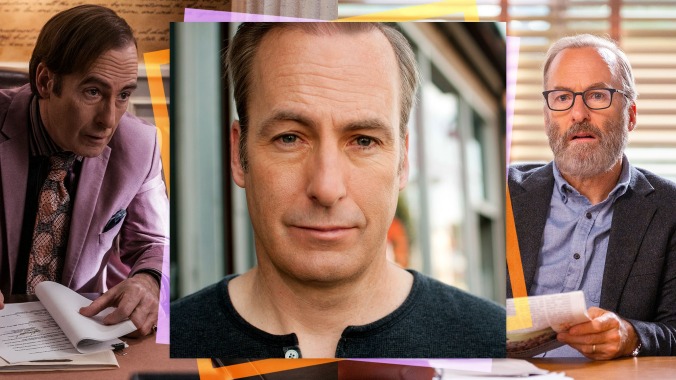Better Call Saul's Bob Odenkirk: “I got into this business to take risks”
Bob Odenkirk talks about why AMC's Lucky Hank is the right fit after Saul, balancing comedy and drama, that David Cross project, and more

When Bob Odenkirk wrapped Better Call Saul last year, bringing an end to his extended run as Saul Goodman, he did it on a high note. Truly, it was all good, man. Now, after years of playing the skeevy yet mesmerizing lawyer in Better Call Saul and Breaking Bad, the award-winning actor has a new small-screen persona. In AMC’s Lucky Hank, Odenkirk stars as Hank Devereaux, a grouchy English professor in the throes of an existential crisis. The comedy-drama, based on a Richard Russo novel, finds Odenkirk playing alongside co-stars Mireille Enos, Diedrich Bader, Suzanne Cryer, Cedric Yarborough, and Olivia Scott Welch.
Odenkirk has been an A.V. Club favorite for decades, and the outpouring of love after his 2021 health scare reinforced the mark he’s left in the industry. He excels at being uniquely funny (go back to Mr. Show for proof), and Lucky Hank allows Odenkirk to tap his innate comedic skills while expanding the dramatic chops he cultivated over six seasons of Saul.
The A.V. Club spoke to Odenkirk about navigating genres for Lucky Hank (which premieres March 19), the—serious voice—craft of acting, his forthcoming project with David Cross, and whether he appears in the new season of Netflix’s I Think You Should Leave With Tim Robinson.
The A.V. Club: What was it about Lucky Hank that made you want to jump right into it after all those years as Saul Goodman on Breaking Bad and Better Call Saul?
Bob Odenkirk: I thought I needed to do this because I liked the writing. I really liked how the character was funny but aware of it, as opposed to Saul Goodman, who was also funny, but you often laughed at him more than with him. I liked that Hank loves his wife, and she loves him; he loves his daughter, and she’s annoyed by him but presumably loves him. That was all very, very different from Saul. Saul was very much a loner in my book. He was alone in this world and was going to stay that way. To play somebody who was connected with and understood people was refreshing. The stakes are, of course, a great deal lower than they were on a show like Saul.
I also related to the world of Lucky Hank a lot. I have friends in academia and know it’s a hot box of status and people trying to feel vindicated and validated. I thought it was a smart place to put people and get characters riled up. I also enjoyed the book. The tone of it is a hard thing to achieve. We kept talking about Alexander Payne movies like Sideways. You can almost see in Lucky Hank, it’s a 50-50 mix of comedy and drama. Usually, the comedy is broader and stronger, and then the drama comes in at the tail end, or the drama is heavy with moments of humor. But to try and mix both, as it goes in Lucky Hank, it’s equally split. That’s hard to do, but I like doing tough things. I got into the [business] to do different things and to take risks. It’s one of the joys of being in this business.
AVC: This segues into my next question. Within five minutes of the series premiere, the understated comedy is established when Hank has an outburst in front of his students. Your background, and showrunner Paul Lieberstein’s experience with The Office, are louder forms of humor. Was it difficult to contain that for Lucky Hank?
BO: Yeah, what you’re pointing to is challenging for me. Sometimes you just want to cut loose and be really silly. Sometimes I would do that. I would say, “Can I do a take like that?” And we would do it to get it out of my system, and I would learn from that. But yes, I believe it’s harder for me than for Paul. I think it’s okay to push the envelope a little bit and take it to a sillier place, but here it was mostly about riding the line in between. It’s what I do best in comedy. I can be silly but I think I’m most fun when I’m mixing a grounded, dramatic character who is being a little silly. That’s when I’m the funniest, you know?
 Keep scrolling for more great stories.
Keep scrolling for more great stories.
